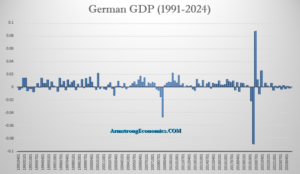A Crucial Moment for Germany: Insights on the Upcoming Election and Economic Challenges

As Germany approaches a pivotal snap election on February 23, the political landscape is anything but stable. The current government, led by Chancellor Olaf Scholz, faces substantial backlash as polls indicate the CDU/CSU coalition has gained a significant lead. This scenario is reminiscent of tumultuous periods in Germany’s past, including the infamous hyperinflation of the early 1920s, when a government decision to confiscate a portion of citizens’ assets created widespread economic turmoil. History has a way of repeating itself, and the current sentiment among the electorate is rooted in deep-seated frustrations.
The Rise of the AfD and Political Polarization
Recent polling suggests that the far-right Alternative for Germany (AfD) is consolidating its position, while Scholz’s Social Democratic Party (SPD) struggles to maintain relevance, having lost over 12% since the last election. The traditional understanding of political centrism in Germany is increasingly being challenged, as the landscape becomes dominated by right-wing rhetoric and populism.
Politically, the narrative is deeply fragmented. The AfD, initially propelled into the political sphere by the influx of migrants under former Chancellor Angela Merkel, has tapped into fears of cultural erosion and economic instability, advocating for a nationalistic and anti-immigration stance. On the other end of the spectrum, parties like the Greens and the far-left Linke continue to push progressive policies, often at the expense of dialog with the populace.
The Impact of COVID-19 and Economic Consequences
Another factor influencing public sentiment is the fallout from the COVID-19 pandemic. Germany has been grappling with the aftermath, with various measures, including mandatory vaccinations for children, prompting portions of the populace to seek refuge in more permissive countries like the UAE. The pandemic magnified existing issues, and citizens who previously underestimated the impact of policy decisions now find themselves at odds with their government’s handling of the crisis.
In recent years, Germany’s economy has been suffering. The sanctions imposed on Russia and aggressive policies adopted by the current government have not only strained relations abroad but have also hampered local industry. Recent economic forecasts show a contraction; our proprietary economic models suggest a staggering 3% reduction in growth attributed to these decisions, heavily impacting pivotal sectors like automotive and manufacturing.

Authoritarianism and the Threat to Democracy
Perhaps most troubling is the authoritarian drift observed in European politics. The prospect of disregarding election results based on their outcomes—such as threatening to annul a potential AfD victory—raises significant concerns about the state of democracy in Germany and throughout Europe. Safeguarding free speech becomes even more critical when the rhetoric shifts towards labeling dissenting voices as far-right and dangerous.
The real danger might lie in the notion that a select few dictate what is acceptable to discuss or protest. Disregarding societal grievances could lead to civil unrest reminiscent of past upheavals, a reality that policymakers seem keen to ignore.
Why Extreme Investor Network Stands Out
At Extreme Investor Network, we provide more than just surface-level analysis. We delve into the socio-economic factors that drive political change, helping our readers understand the full context of these matters. The intersection of economic theory, historical precedents, and current political events is crucial for informed decision-making in both personal finance and broader geopolitical strategies.
As the world watches Germany’s election unfold, staying attuned to these nuances will be vital. We encourage our readers to engage with our resources, which offer not only expert insights but also historical parallels that help frame today’s challenges. It’s time to understand the complexities of the economy and the political landscape as never before—welcome to the Extreme Investor Network, where knowledge is your greatest asset.

Together, let’s build a community that values clarity in a rapidly shifting world.

